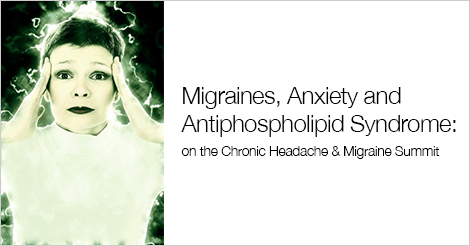
The autoimmune condition called Antiphospholipid Syndrome (APS) is one of many possible contributing factors for both migraines and anxiety. I came across this condition when researching the links between migraine and anxiety in preparation for my interview with Erin Knight, one of the hosts of The Chronic Headache & Migraine Summit. This is one of the reasons I love presenting because I get to learn so much too!
Antiphospholipid syndrome occurs when your immune system attacks some of the normal proteins in your blood. It can cause blood clots in your arteries or veins. And it can cause pregnancy complications, such as miscarriage and stillbirth. (Source: Mayo Clinic)
I share some highlights from a 2015 paper: Antiphospholipid antibodies as biomarkers in psychiatry
- Antiphospholipid syndrome (APS) has been implicated in a range of neuropsychiatric presentations
- The link between depression, stroke, and cardiovascular disease could be explained in at least some patients by the presence of aPL antibodies
- Approximately one in five (20%) strokes in individuals under the age of 45 years are associated with APS
- Migraine is one of the most commonly observed symptoms in patients with APS
- aPL antibodies are often found to show low or moderately positive levels which makes this syndrome a diagnostic dilemma in psychiatry. The St. Thomas ‘alternative criteria’ for APS may be a useful clinical tool for psychiatrists. These criteria include cognitive impairment, affective disorders [like depression and anxiety], headaches [or migraines], and livedo reticularis, with improvement after aspirin treatment
In case you are not familiar with livedo reticularis, it is a mottled purplish discoloration of the skin. Having this skin condition does not mean you have APS because livedo reticularis can be a normal condition that is simply more obvious when you are exposed to the cold. It can also be an indicator of impaired circulation.
Phospholipids are a class of lipids that are a major component of all cell membranes and also facilitate neurotransmitters communication so this condition affects serotonin, dopamine, glutamate and GABA levels.
Working with my client’s doctor, I would recommend an autoimmune dietary approach and trials of the respective amino acids to support low serotonin, low GABA (anxiety is common with migraine sufferers) and low dopamine.
We also discuss how effective gluten removal can be for my clients with anxiety and migraines and find it to be a common underlying factor (whether it’s celiac disease or gluten sensitivity). Since gluten is always an important factor for autoimmunity it should always be explored if APS has been diagnosed or is suspected.
We also cover low serotonin as one possible cause of migraines and the how to do a trial of tryptophan (instead of SSRIs). Using tryptophan also addresses the low serotonin that often occurs with APS and is one possible contributing cause of the anxiety, depression, insomnia and migraines.
Hosts of The Chronic Headache & Migraine Summit, Erin Knight, Corey Schuler and Marta Taylor, are familiar with headache pain and migraines; they’ve all experienced severe headache problems. They found functional medicine solutions, which they now share in their health practices each day.